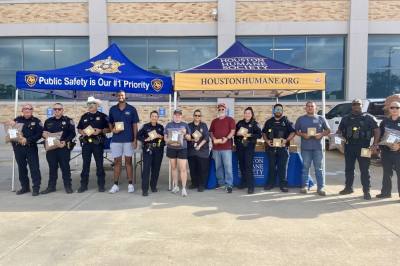Macey Kohne-Sanchez, assistant marketing manager at the Houston Humane Society, said both the heat and the post-pandemic lockdown return to work played a significant role in exacerbating the shelter capacity crisis around the Houston area.
What's happening
The Houston Humane Society, a nonprofit animal welfare organization, is housing over 500 animals and experiencing severe overcrowding issues at its Houston-based shelter, according to a news release from the Houston Humane Society.
The shelter has a fluctuating capacity limit; the number is relative to the amount of space available, size of each animal, and the availability of volunteers and employees. However, over 500 animals at this time of year are considered a definitive state of overcrowding, according to the release.
“In the past month alone, the Houston Humane Society has taken in 304 animals, including 46 cruelty victims, 114 owner surrenders and 88 strays,” Kohne-Sanchez said.
The increase in the homeless animal population can be attributed to various factors, Kohne-Sanchez said.
Rising housing prices as well as the daily cost of living have left low-income families with limited options for pet ownership due to the inability to afford additional expenses.
The return to full-time in-person work has also led to an influx of abandoned animals due to owners not anticipating the time and money needed for their pets.
The ongoing heat wave has drawn attention to the plight of stray and street animals, prompting more individuals to become concerned for their well-being, Kohne-Sanchez said.
The approach
To address shelter overcrowding and ensure the welfare of animals, the Houston Humane Society introduced its Pet Pantry Program this year with more frequent public outreach events.
In partnership with the community, the program offers medical care and resources such as free pet food to families facing financial difficulties, preventing them from having to surrender their pets.
Spaying and neutering are also essential measures to control the breeding of both domestic and feral animals, Kohne-Sanchez said. The local commitment to these efforts has contributed “to a 94% live release rate at the Houston Humane Society Shelter,” Kohne-Sanchez said.
Additionally, the Houston Humane Society launched a Shelter Swap initiative in response to recent overcrowding issues to relocate long-stay dog shelter residents, providing increased exposure and opportunities for adoption.
Get involved
Addressing not only overcrowding but also animal cruelty is a concern of the society, according to the release. The society collaborates with the 927-PAWS Taskforce, a Harris County animal welfare service, to educate the public on reporting cruelty.
To get involved, community members can:
- Donate supplies in person at the shelter at 14700 Almeda Road, Houston
- Make monetary donations in person or online via the society’s official website
- Participate in one of the upcoming adoption or food donation events
- Volunteer at the shelter to help with basic duties as needed
The future
Looking ahead, the Houston Humane Society aims to foster a culture of responsible pet ownership, reduce shelter populations through rehoming programs and expand foster-based efforts. The organization remains committed to spaying and neutering campaigns to address overpopulation at its source, Kohne-Sanchez said.
Quote of note
“Adopt, don't shop, like, that's something that we're struggling with, people wanting the fancy breeds,” Kohne-Sanchez said. “We have those in rescue; you don't have to go and buy a dog for thousands of dollars because you most likely can find exactly what you're looking for at your local shelter and help the overcrowding problem.”






